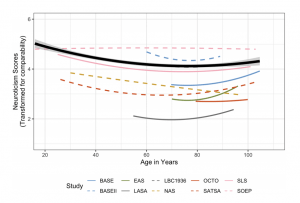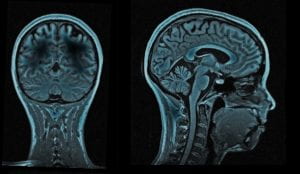Personality Trait Change
 Personality traits–characteristic patterns of thoughts, feelings, and behaviors–can and do change as people age. For example, using data from 16 longitudinal samples, our research group found that conscientiousness, extraversion, and openness decreases with age, and neuroticism increases in late life. These group-level patterns suggest “normative” age-related changes in personality traits. But individuals also differ substantially around these normative trajectories. Some people experience socially desirable patterns of personality trait change, increasing in traits such as conscientiousness and decreasing in neuroticism as they get older. Other people experience negative patterns of personality trait change, decreasing in conscientiousness as their social and professional responsibilities wane and increasing in neuroticism as health-related fears become more salient in late life. Our research investigates the the factors that account for individual differences in personality trait change. In addition to Big Five personality traits, we are also interested in change in other important individual differences such as well-being, affect, and cognition across the adult lifespan, as well as their dynamics in everyday life.
Personality traits–characteristic patterns of thoughts, feelings, and behaviors–can and do change as people age. For example, using data from 16 longitudinal samples, our research group found that conscientiousness, extraversion, and openness decreases with age, and neuroticism increases in late life. These group-level patterns suggest “normative” age-related changes in personality traits. But individuals also differ substantially around these normative trajectories. Some people experience socially desirable patterns of personality trait change, increasing in traits such as conscientiousness and decreasing in neuroticism as they get older. Other people experience negative patterns of personality trait change, decreasing in conscientiousness as their social and professional responsibilities wane and increasing in neuroticism as health-related fears become more salient in late life. Our research investigates the the factors that account for individual differences in personality trait change. In addition to Big Five personality traits, we are also interested in change in other important individual differences such as well-being, affect, and cognition across the adult lifespan, as well as their dynamics in everyday life.
Selected Representative Publications
- Mroczek, D.K., Graham, E.K., Turiano, N.A., & Oro-Lambo, M.O. (2021). Personality Development in Adulthood and Later Life. In Robins, R.W., John. O.P., & Pervin, L.A. (Eds.) Handbook of Personality: Theory and Research (4th Edition). New York: Guilford.
- Graham, E.K., Weston, S.J., Gerstorf, D., Yoneda, T.B., Booth, T., Beam, C.R., Petkus, A.J., Drewelies,J., Hall, A.N., Bastarache, E.D., Estabrook, R., Katz, M.J., Turiano, N.A., Lindenberger, U., Smith, J.,Wagner, G.G., Pedersen, N.L., Allemand, M., Spiro, A., Deeg, D.J.H., Johansson, B., Piccinin, A.M.,Lipton, R.B., Schaie, K.W., Willis, S., Reynolds, C.R., Deary, I.J., Hofer, S.M., & Mroczek, D.K. (2020). Trajectories of Big Five Personality Traits: A Coordinated Analysis of 16 Longitudinal Samples. European Journal of Personality, 34, 301-321.
- Mroczek, D. K., & Spiro III, A. (2005). Change in life satisfaction during adulthood: findings from the veterans affairs normative aging study. Journal of Personality and Social Psychology, 88, 189.
- Mroczek, D. K., & Kolarz, C. M. (1998). The effect of age on positive and negative affect: a developmental perspective on happiness. Journal of Personality and Social Psychology, 75, 1333.
Personality Traits, Well-being, and Health
 Our group conducts research to investigate how personality traits, well-being, and health are reciprocally related to each across the lifespan. Specifically, we examine how personality traits may impact different dimensions of well-being (e.g., subjective well-being, psychological well-being) and different types of health behaviors (e.g., drinking, smoking, medication adherence) and outcomes (e.g., physical health, mortality) over the long run, as well as the influences of personality traits on changes in well-being and health. Meanwhile, we also investigate how well-being and health-related experiences may shape subsequent personality change in adulthood.
Our group conducts research to investigate how personality traits, well-being, and health are reciprocally related to each across the lifespan. Specifically, we examine how personality traits may impact different dimensions of well-being (e.g., subjective well-being, psychological well-being) and different types of health behaviors (e.g., drinking, smoking, medication adherence) and outcomes (e.g., physical health, mortality) over the long run, as well as the influences of personality traits on changes in well-being and health. Meanwhile, we also investigate how well-being and health-related experiences may shape subsequent personality change in adulthood.
Selected Representative Publications
- Luo, J., Zhang, B., Estabrook, R., Graham, E. K., Driver, C. C., Schalet, B. D., Turiano, N., A. Spiro, A., & Mroczek, D. K. (2022). Personality and health: Disentangling their between-person and within-person relationship in three longitudinal studies. Journal of Personality and Social Psychology, 122, 493-522.
- Graham, E. K., Weston, S. J., Turiano, N. A., Aschwanden, D., Booth, T., Harrison, F., … & Donnellan, M. B. (2020). Is healthy neuroticism associated with health behaviors? A coordinated integrative data analysis. Collabra: Psychology, 6.
- Willroth, E. C., Ong, A. D., Graham, E. K., & Mroczek, D. K. (2020). Being happy and becoming happier as independent predictors of physical health and mortality. Psychosomatic Medicine, 82, 650-657.
- Graham, E.K., Rutsohn, J.P., Turiano, N.A., Bendayan, R., Batterham, P., Gerstorf, D., Katz, M., Reynolds, C., Schoenhofen, E., Yoneda, T., Bastarache, E., Elleman, L.G., Zelinski, E.M., Johansson, B., Kuh, D., Barnes, L.L., Bennett, D., Deeg, D., Lipton, R., Pedersen, N., Piccinin, A., Spiro, A., Muniz- Terrera, G., Willis, S., Schaie, K.W., Roan, C., Herd, P., Hofer, S.M., & Mroczek, D.K. (2017). Personality predicts mortality risk: An integrative analysis of 15 international longitudinal studies. Journal of Research in Personality, 70, 174-186.
- Mroczek, D. K., & Spiro, A. (2007). Personality change influences mortality in older men. Psychological Science, 18, 371-376.
Psychosocial Contributors to Dementia Risk
 Alzheimer’s Disease and Related Dementias (ADRD) is a substantial and rapidly-growing public health problem, with few available disease-modifying treatments. Given limited treatments that target ADRD pathology (e.g., amyloid, tau, Lewy bodies, TDP-43), a promising alternative is to target factors that increase an individual’s ability to tolerate ADRD pathology. Our research group investigates how psychosocial factors, such as personality, well-being, and loneliness, may explain why some people are able to tolerate a higher level of pathology while remaining relatively asymptomatic (i.e., cognitive resilience), whereas others experience severe cognitive impairment in the presence of less pathology (i.e., cognitive vulnerability). This research will improve our understanding of healthy and abnormal cognitive aging, and may aid in the identification of key prevention and intervention targets for ADRD.
Alzheimer’s Disease and Related Dementias (ADRD) is a substantial and rapidly-growing public health problem, with few available disease-modifying treatments. Given limited treatments that target ADRD pathology (e.g., amyloid, tau, Lewy bodies, TDP-43), a promising alternative is to target factors that increase an individual’s ability to tolerate ADRD pathology. Our research group investigates how psychosocial factors, such as personality, well-being, and loneliness, may explain why some people are able to tolerate a higher level of pathology while remaining relatively asymptomatic (i.e., cognitive resilience), whereas others experience severe cognitive impairment in the presence of less pathology (i.e., cognitive vulnerability). This research will improve our understanding of healthy and abnormal cognitive aging, and may aid in the identification of key prevention and intervention targets for ADRD.
Selected Representative Publications
- Graham, E.K., James, B.D., Jackson, K.L., Willroth, E.C., Boyle, P., Wilson, R., Bennett, D., & Mroczek, D.K. (2020). Associations between personality traits and cognitive resilience in older adults. Journal of Gerontology: Psychological Sciences. Online ahead of print.
- Graham, E.K., James, B.D., Jackson, K., Willroth, E.C., Luo, J., Beam, C.R., Pedersen, N., Reynolds, C., Katz, K., Lipton, R.B., Boyle, P., Wilson, R., Bennett, D.A., & Mroczek, D.K. (2021). A coordinated analysis of the associations among personality traits, cognitive decline, and dementia in older adulthood. Journal of Research in Personality, 92, 104100.
Stress and Health
 Our research group investigates how different dimensions of stress are related to various health outcomes across the lifespan. Specifically, we examine the independent and joint influences of stress experienced in different life stages, such as early life and midlife, on health outcomes. We also investigate the relations between different types of stress experiences, such as stress exposure, psychological stress reactions, stress in different life domains, and health outcomes. In addition, we are interested in studying vulnerability and resilience mechanisms underlying the relation between stress and health.
Our research group investigates how different dimensions of stress are related to various health outcomes across the lifespan. Specifically, we examine the independent and joint influences of stress experienced in different life stages, such as early life and midlife, on health outcomes. We also investigate the relations between different types of stress experiences, such as stress exposure, psychological stress reactions, stress in different life domains, and health outcomes. In addition, we are interested in studying vulnerability and resilience mechanisms underlying the relation between stress and health.
Selected Representative Publications
- Luo, J., Zhang, B., Willroth, E. C., Mroczek, D. K., & Roberts, B. W. (2022). The role of general and domain-specific perceived stress in healthy aging. Journal of Gerontology, Series B: Psychological Sciences, 77, 536-549.
- Lee, L. O., Aldwin, C. M., Kubzansky, L. D., Mroczek, D. K., & Spiro, A. (2019). The long arm of childhood experiences on longevity: Testing midlife vulnerability and resilience pathways. Psychology and Aging, 34, 884-899.
- Mroczek, D. K., & Almeida, D. M. (2004). The effect of daily stress, personality, and age on daily negative affect. Journal of Personality, 72, 355-378.
Innovative Open Science and Data Synthesis Methodologies
 The credibility revolution in the social sciences has increased awareness of the need to conduct reproducible, replicable, and generalizable research. Our research group develops and uses innovative methodologies to apply these principles to personality and lifespan research. For example, we often use coordinated data analysis, an approach that simultaneously tests the same research question in multiple datasets using identical statistical models. This approach harnesses the power of diverse longitudinal and international datasets to increase confidence that research findings are robust and replicable and not due to the idiosyncrasies of any single dataset. To facilitate and promote coordinated data analysis in aging research, our lab has published multiple methodological papers on the topic and has contributed to the Integrative Analysis of Longitudinal Studies of Aging and Dementia, an interdisciplinary, cross-national research network. In addition to coordinated data analysis, our lab is also interested in data synthesis methodologies more broadly, approaches to pre- registration, and solutions to problems associated with data overuse.
The credibility revolution in the social sciences has increased awareness of the need to conduct reproducible, replicable, and generalizable research. Our research group develops and uses innovative methodologies to apply these principles to personality and lifespan research. For example, we often use coordinated data analysis, an approach that simultaneously tests the same research question in multiple datasets using identical statistical models. This approach harnesses the power of diverse longitudinal and international datasets to increase confidence that research findings are robust and replicable and not due to the idiosyncrasies of any single dataset. To facilitate and promote coordinated data analysis in aging research, our lab has published multiple methodological papers on the topic and has contributed to the Integrative Analysis of Longitudinal Studies of Aging and Dementia, an interdisciplinary, cross-national research network. In addition to coordinated data analysis, our lab is also interested in data synthesis methodologies more broadly, approaches to pre- registration, and solutions to problems associated with data overuse.
Selected Representative Publications
- Mroczek, D.K., Weston, S.J., Graham, E.K., & Willroth, E.C. (2022). Data overuse in aging research: Emerging issues and potential solutions. Psychology and Aging, 37, 141-147.
- Graham, E.K., Willroth, E.C., Piccinin, A., Weston, S.J., Muniz, G., Clouston, S.A.P., Hofer, S.M., Mroczek, D.K. (2022). Coordinated data analysis: Knowledge accumulation in lifespan developmental psychology. Psychology and Aging, 37, 125-135.
- Willroth, E.C., Graham, E.K., & Mroczek, D.K. (2022). Challenges and opportunities in preregistration of coordinated data analysis: A tutorial and template. Psychology and Aging, 37, 136-140.